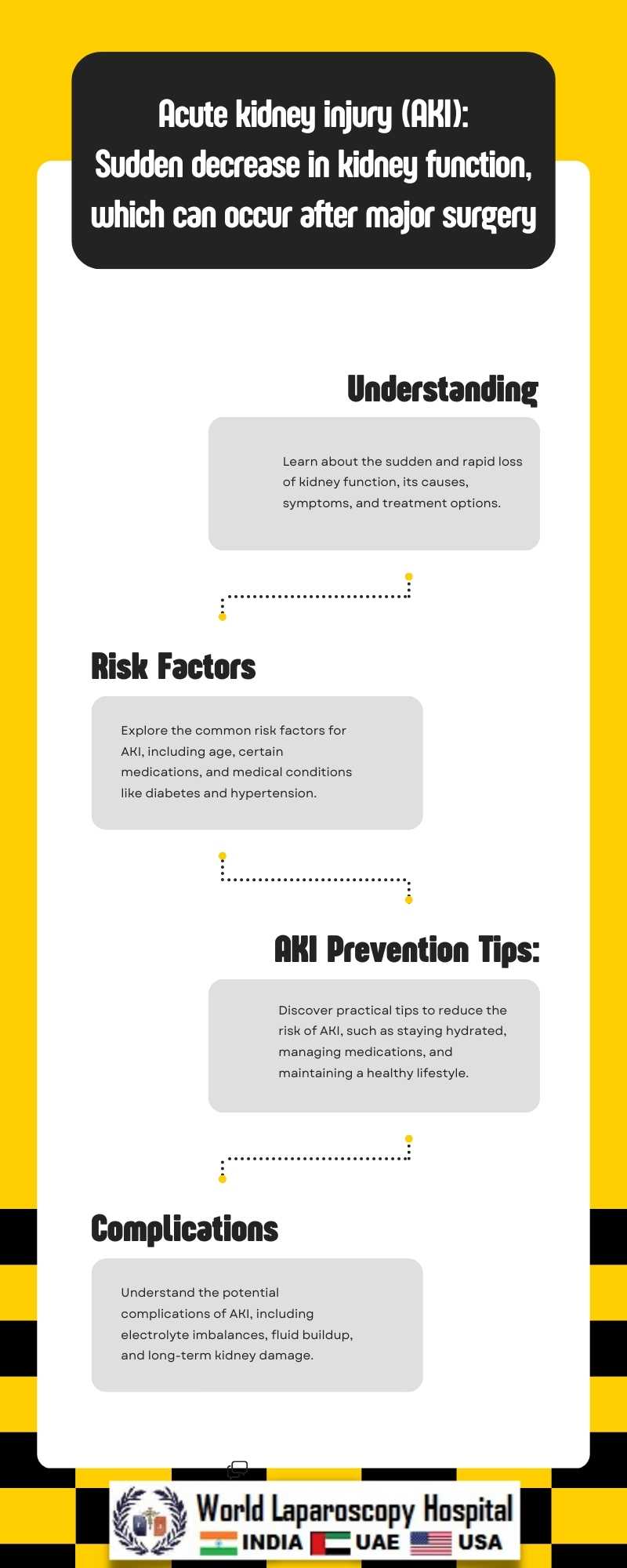Acute kidney injury (AKI): Sudden decrease in kidney function, which can occur after major surgery
Acute Kidney Injury (AKI): A Critical Complication Post Major Surgery
Acute Kidney Injury (AKI), previously known as acute renal failure, is a sudden and often reversible decrease in kidney function. This condition can occur following major surgeries and is a significant concern in the realm of surgical medicine. The kidneys, vital organs responsible for filtering waste and excess fluids from the blood, are particularly vulnerable during and after surgical procedures due to various factors such as changes in blood flow, exposure to contrast agents, and the effects of anesthesia.

One of the primary causes of AKI after surgery is ischemia-reperfusion injury, which results from the temporary interruption of blood flow to the kidneys during surgery followed by the restoration of blood flow. This process can lead to tissue damage and impaired kidney function. Additionally, the use of nephrotoxic drugs, such as certain antibiotics and contrast agents, can further exacerbate the risk of AKI in surgical patients.
The incidence of AKI following major surgery varies depending on the type of surgery, patient's pre-existing health conditions, and other factors. However, studies have shown that AKI occurs in approximately 1-30% of patients undergoing major surgical procedures, making it a significant postoperative complication.
The clinical presentation of AKI can vary widely, ranging from mild changes in kidney function to severe kidney failure requiring dialysis. Common signs and symptoms of AKI include decreased urine output, fluid retention, electrolyte imbalances, and metabolic acidosis. Early recognition and management of AKI are crucial in preventing further kidney damage and improving patient outcomes.
The management of AKI post major surgery involves a multi-faceted approach aimed at addressing the underlying cause, supporting kidney function, and preventing complications. This may include optimizing fluid balance, adjusting medications, and, in severe cases, initiating renal replacement therapy. Close monitoring of kidney function through laboratory tests is essential to assess the effectiveness of treatment and guide further management.
Prevention of AKI in surgical patients is a key area of focus for healthcare providers. Strategies such as adequate hydration, avoiding nephrotoxic medications whenever possible, and careful monitoring of high-risk patients can help reduce the incidence of AKI. Additionally, advancements in surgical techniques and perioperative care have contributed to improved outcomes and reduced the risk of AKI in surgical patients.
Conclusion:
AKI is a serious complication that can occur following major surgery. Understanding the risk factors, clinical presentation, and management strategies for AKI is essential for healthcare providers involved in the care of surgical patients. By implementing preventive measures and early intervention, the incidence and impact of AKI in surgical patients can be minimized, leading to better outcomes and improved patient care.
Acute Kidney Injury (AKI), previously known as acute renal failure, is a sudden and often reversible decrease in kidney function. This condition can occur following major surgeries and is a significant concern in the realm of surgical medicine. The kidneys, vital organs responsible for filtering waste and excess fluids from the blood, are particularly vulnerable during and after surgical procedures due to various factors such as changes in blood flow, exposure to contrast agents, and the effects of anesthesia.

One of the primary causes of AKI after surgery is ischemia-reperfusion injury, which results from the temporary interruption of blood flow to the kidneys during surgery followed by the restoration of blood flow. This process can lead to tissue damage and impaired kidney function. Additionally, the use of nephrotoxic drugs, such as certain antibiotics and contrast agents, can further exacerbate the risk of AKI in surgical patients.
The incidence of AKI following major surgery varies depending on the type of surgery, patient's pre-existing health conditions, and other factors. However, studies have shown that AKI occurs in approximately 1-30% of patients undergoing major surgical procedures, making it a significant postoperative complication.
The clinical presentation of AKI can vary widely, ranging from mild changes in kidney function to severe kidney failure requiring dialysis. Common signs and symptoms of AKI include decreased urine output, fluid retention, electrolyte imbalances, and metabolic acidosis. Early recognition and management of AKI are crucial in preventing further kidney damage and improving patient outcomes.
The management of AKI post major surgery involves a multi-faceted approach aimed at addressing the underlying cause, supporting kidney function, and preventing complications. This may include optimizing fluid balance, adjusting medications, and, in severe cases, initiating renal replacement therapy. Close monitoring of kidney function through laboratory tests is essential to assess the effectiveness of treatment and guide further management.
Prevention of AKI in surgical patients is a key area of focus for healthcare providers. Strategies such as adequate hydration, avoiding nephrotoxic medications whenever possible, and careful monitoring of high-risk patients can help reduce the incidence of AKI. Additionally, advancements in surgical techniques and perioperative care have contributed to improved outcomes and reduced the risk of AKI in surgical patients.
Conclusion:
AKI is a serious complication that can occur following major surgery. Understanding the risk factors, clinical presentation, and management strategies for AKI is essential for healthcare providers involved in the care of surgical patients. By implementing preventive measures and early intervention, the incidence and impact of AKI in surgical patients can be minimized, leading to better outcomes and improved patient care.
1 COMMENTS
Dr. Vishey Patil
#1
Feb 26th, 2024 5:49 am
AKI post-major surgery necessitates thorough comprehension by healthcare providers. Recognizing risk factors, clinical signs, and management is vital for patient care. Preventive measures and early intervention reduce AKI incidence and enhance surgical patient outcomes.
| Older Post | Home | Newer Post |

